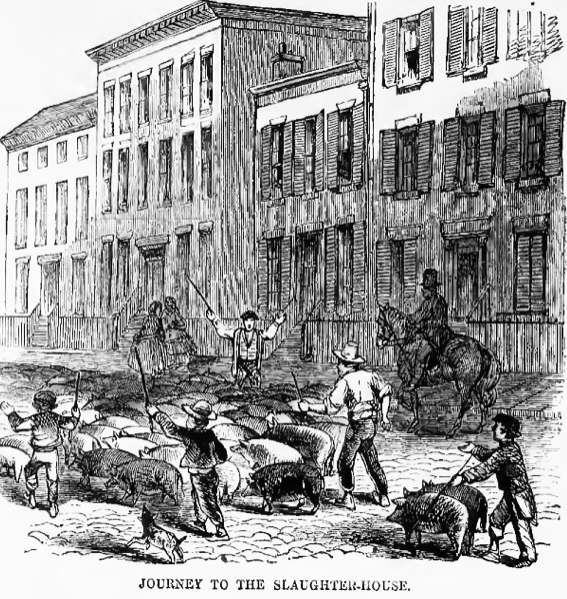Porkopolis, Cincinnati, Ohio, the City where pigs fly and hogs were herded to slaughter through the quiet residential streets. During pork season walking your hogs to market was the most efficient way to get your hogs to the processing plant from the farm.
Eventually the smells and stepping around and through hog manure and then tracking it into your house caused an outcry of rebellion to the practice. (Probably the health department had something to say about it as well.
Anyway, some very smart people decided that for the betterment of the population, the corralling of hogs along the sidewalks was not in the best interest of the people (or our future pork chops).

Ken Rechtin
According to the US EPA, there are 250 open top hammer mills operating in the United States of America. For many years this marvel of modern machinery served us well. The open top hammer mill viciously consumes whole automobiles and spits out shredded steel along with “fluff” from the shredded sets and plastics. It is widely reported that over 80% of the automobile is recycled by the scrap yards of today. For many years this is the way we efficiently recycled steel.
But as the US EPA says:
“Significant amounts of non-metal materials are contained in the shredded materials, which can vaporize and become organic air emissions. These materials include plastics, paints, caulks, sealants, rubber, switches, fluids, and fluid residues. The process of grinding and shredding scrap metal generates heat, resulting in residual fluids and fuels becoming gases. The violent nature of the process creates the potential for particulate matter emissions of various sizes. Thus, the process generates emissions of VOCs, particulate matter, and hazardous air pollutants including lead, zinc, cadmium, mercury, and organic pollutants.”
The US EPA has found it’s not very healthy for us humans! (Probably not healthy for pigs as well.)
In July of 2021, the United States Environmental Protection Agency published EPA Enforcement Alert, EPA310-F-21-003:
“The U.S. Environmental Protection Agency (EPA) is publishing this enforcement alert (Alert) because EPA and state investigations have identified Clean Air Act violations at metal recycling facilities that operate auto and scrap metal shredders, causing excess emissions of air pollution.
“Facilities process the scrap materials by sorting and stockpiling incoming recyclable materials. Shred-able materials are processed by loading and conveying materials into a hammermill shredder that breaks apart materials into a size suitable for further processing. The shredded material is then conveyed through various separating mechanisms— magnetic and eddy current—to separate out ferrous metal, nonferrous metal, and non-metal materials. Recovered scrap metals are sold to end users, such as manufacturers, mills, foundries, secondary smelters, and metal brokers.
“Significant amounts of non-metal materials are contained in the shredded materials, which can vaporize and become organic air emissions.
The process of grinding and shredding scrap metal generates heat, resulting in residual fluids and fuels becoming gases. The violent nature of the process creates the potential for particulate matter emissions of various sizes. Thus, the process generates emissions of VOCs, particulate matter, and hazardous air pollutants including lead, zinc, cadmium, mercury, and organic pollutants.”
River Metals Recycling (RMR), owned by Nucor (NUE on the NYSE), a Kentucky Limited Liability Corporation located in the City of Newport, operates just such a facility as described in the EPA Enforcement Alert.
During regular operations as well as following violent, house shaking explosive events, clouds of gases and particulate matter float over the west side of Newport, a densely populated residential area.
Local Newport neighborhood citizen groups, as well as The City of Newport, have banded together seeking a resolution.
In a follow up op-ed, I will outline three hammer mill sites that have begun changes which will comply with the Federal Clean Air Act. These companies did not initiate change on their own. Regulatory actions of state and federal authorities persuaded them to change.
So, you ask: “How can I help?”
Please contact your Federal and State Senators, Federal and State Representatives and any regulatory bodies at the state and federal levels. Ask them to enforce the Federal Clean Air Act and require that RMR and other companies not pollute our air, water, and earth.
Ken Rechtin is a Newport City Commissioner.
















